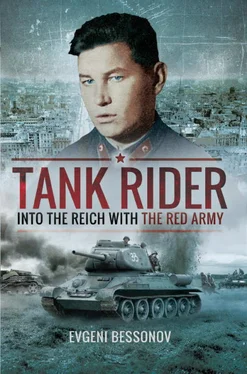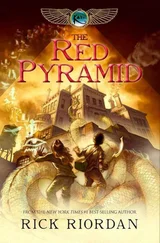The brigade had suffered significant losses in personnel and hardware in fighting for Skalat. The 3rd company commander, Senior Lieutenant Grigoriev, was wounded; platoon leaders Lieutenant Kravtsov (he was burnt by petrol from a petrol bomb that broke at his feet), Gavrilov and someone else, as well as Sergeant Major Vasya Blokhin, my friend from Siberia, were wounded. The commander of the second company, Senior Lieutenant Gulik, the commander of the submachine-gun company, Lieutenant Kolomiitsev, and some other officers were killed. In front of my eyes a sniper killed a leader of a machine-gun platoon from the machine-gun company, a tall, slim and cheerful Bashkirian Lieutenant. He was supporting our two platoons, mine and Shakulo’s, with his machine-gun platoon. We buried him in the garden of a house. I am sorry that I cannot remember his name, or the names of soldiers from my platoon who were killed in Skalat.
We were young, did not have any experience in life, and cared very little about our lives and the lives of others; sometimes we were even indifferent. In Skalat the soldiers arranged a game with death. Quite a brilliant idea they had: they ran from one side of the street to another under machine-gun fire from a German tank. They had a competition – who could run across the street fastest and not be hit. Normally Fritz would be late and open fire on an empty spot. Some soldiers ran across the street several times and even I dared to run across the street once, so that I would not look like a coward in the eyes of my subordinates. Luckily, no one was hit. I think that the Germans did not quite understand our game and thought that we were mounting an attack and were leaving several important buildings without a fight. Such things happened. Everything could happen in the war, and we considered such things normal.
After the end of battles for Skalat, when our company marched on the central street, I noticed the façade of a house, which looked more like a sieve – it was all battered by shells. I asked the soldiers whose house it was and how defenders could have stayed there. The men laughed and said that it was our house, the house where we had stayed for several days. I came up to company leader Titov; zampolit Gerstein was also there. I pointed at the building, told him about the conditions that we had had to fight in. Titov also remarked to the zampolit of the battalion that it was amazing how the company could hold such a battered building and repel German attacks, closing their access to the rear of the battalion. ‘Was it hard?’ Gerstein asked. What could I answer? I said: ‘It was OK.’
THE BATTLE FOR GUSYATIN

From 20 March, 1944, onwards the Brigade received a new order: to advance towards the south and south-east to the towns of Gusyatin and Kamenets-Podolsk. Tridtsatchetverkas arrived, and our company left as tank riders with the Brigade’s vanguard, as we had had fewer casualties in the previous battles (tridtsatchetverka is a nick-name for T-34 tanks – translator’s comment) . It was also because the 2nd and 3rd companies, as well as the anti-tank rifle platoon, had lost their company commanders and platoon leader. These three companies only had one platoon leader each – Lieutenant Chernyshov in the 2nd company, Junior Lieutenant Belyakov in the 3rd company and Junior Lieutenant Drogovoz in the anti-tank rifle company. A five-day march to Kamenets-Podolsk started, with the objective to liberate it and encircle the enemy. At that time Kamenets-Podolsk was the centre of a province. We advanced on Studebaker trucks. Those trucks were real beasts! Sometimes they would rumble on the mud roads like tanks. We would travel on T-34 tanks even more often. The offensive was almost round the clock – during day and night, often we would make a long halt, hiding from the enemy’s air force, which inflicted high losses on us, both in personnel and even tanks.
We continued to survive on ‘grandmother’s rations’ – that is, on the food provided by the villagers. After the town of Skalat the brigade left the Western Ukraine and again marched in the eastern part of Ukraine, where the local population was happy to see us, often meeting us with tears of joy in their eyes. If we rushed through a village without stopping, villagers would throw loaves of bread and lard to us; we always shared this food with the tank crews. Several times in good weather we were bombed, but all worked out fine: in such cases we would quickly jump down from the tanks, scattering in all directions from the road. Tanks would also leave the road, trying to find some natural shelter – in a ravine, a depression, even stopping in the shade of a tree, as it was harder to be spotted under a tree. In daytime, during short halts, we normally parked tanks in the shade of a house or a barn. We camouflaged not only the tanks, but also trucks and other vehicles, and soldiers tried not to wander too much around the village. Sometimes we even asked the villagers not to stoke their stoves, as smoke from chimneys could draw the attention of the German air force. Germans had an all-weather scout plane that we called a ‘frame’ (this is the German Focke Wulf FW 189 artillery observer’s and scout plane; some Russians also called it a ‘crutch’ – translator’s note) . It was a two-fuselage aircraft, which would normally fly at high altitudes and had good optics. When a frame appeared, every activity froze on our territory, otherwise, if the frame spotted anything, the bombers of the enemy arrived. Soviet fighters would rarely engage the frame, because at its altitude and with its speed the frame would quickly disappear.
Our Tank Army, including our 49th Mechanized Brigade, was deep in the rear of the enemy. The Germans put up resistance only in isolated points along the line of our advance. There would be days when we saw no Germans at all, or they would try to stop our advance with hastily set-up defences, which we broke without any difficulties. They put up significant resistance in the fight for town of Gusyatin, on 22 and 23 March, 1944. Our 1st motor rifle battalion, and of course our company, took part in the town’s liberation. During the night of 23 March, when the enemy was driven out of the city, Petr Shakulo and I stopped at the town’s outskirts, where we settled in several huts to give some rest to the soldiers.
We could barely stand on our feet from exhaustion, as all day long we had walked on foot, eliminating separate pockets of resistance. Tanks did not always help us in those encounters, as they supported other battalions of our brigade. In darkness and in action we lost communication with company commander Titov and battalion commander Kozienko, as well as other companies of the battalion. Communication and co-ordination is the cornerstone in every action and one should never lose communication, but we were happy to have some rest after driving Germans out of the city. We decided that we would gain understanding of the situation at dawn, so we did not look for the company commander. Just in case, we put guards at the hut and arranged shifts. Night came, we managed to heat up the stove, took off our wet greatcoats and boots in order to dry our puttees and fell fast asleep. Late at night the guard, who went into the hut to warm up a bit, heard a knocking on the door. The guard opened the door, and heard German language, shouted ‘Germans! Germans!’ and opened submachine-gun fire.
Other soldiers woke up; many of them made it outside the hut and also opened fire. However, the Germans managed to disappear, shouting ‘Ivanen! Ivanen!’ – this is what they called us, the Red Army soldiers.
Читать дальше














